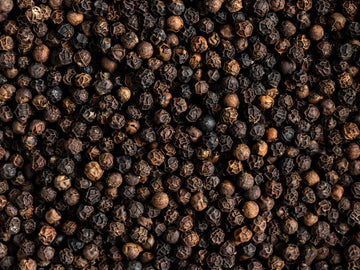L-theanine is an amino acid primarily found naturally in green tea (Camellia sinensis) and some mushrooms (Boletus badius). It was discovered in Camellia sinensis in 1949 and in 1950 it was successfully isolated in a lab in Kyoto, Japan from the leaves of a common Japanese green tea called gyokuro which has high theanine content. L-theanine is commonly used as a supplement to aide focus, reduce anxiety and stress, and improve sleep.
Theanine comes from the Latinized form of the Greek word "thea" meaning tea. The "L" in L-theanine refers to the specific arrangement of the molecule, called an enantiomer. There is also D-theanine, which is the other enantiomer, a mirror image of L-theanine. D-theanine is rarely found naturally and is rarely discussed in any context. Therefore, theanine without a prefix is generally referring to L-theanine.

Gyokuro is only grown in Japan. It is grown in shade which increases L-theanine and umami content.
How does L-theanine reduce anxiety and stress?
L-theanine reduces anxiety and promote relaxation through different mechanisms including increasing neurotransmitters, enhancing alpha brain waves, reducing glutamate, and modulating cortisol levels.
Increasing Neurotransmitters
L-theanine crosses the blood-brain barrier and influences the central nervous system directly. It increases the production and release of neurotransmitters such as serotonin, dopamine, and GABA [1]
- Serotonin: Often referred to as the "feel-good" neurotransmitter, serotonin helps regulate mood, happiness, and anxiety. L-theanine's ability to increase serotonin levels can lead to improved mood balance and reduced stress.
- Dopamine: This neurotransmitter is crucial for pleasure, motivation, and reward. By boosting dopamine levels, L-theanine can enhance feelings of pleasure and decrease tension.
- GABA: Stimulates relaxation by lowering the amount of activity and excitability of neurons it binds to in the brain; it slows things down. High neural activity causes things like restlessness, stress, and anxiety. Many anti-anxiety medications such as benzodiazepines like Xanax work by increasing the effect of GABA. L-theanine increases GABA levels, which promotes relaxation and can mitigate the physiological and psychological reactions to stress.
Enhancing Alpha Brain Waves
Alpha brain waves refer to the type of electrical activity that occurs in the brain between the frequency of 8 to 14 Hz. This type of electrical activity is associated with a state of relaxed wakefulness. These states are often observed during activity like light meditation where you are alert but not sedated. L-theanine directly stimulates the production of alpha brain waves [2].
Reducing Glutamate
Glutamate is a key neurotransmitter in the brain, acting primarily as an excitatory signal, meaning it stimulates brain cells to fire. Glutamate is involved in almost every major excitatory function in the brain, enhancing the electrical activity of neurons. When glutamate levels are excessively high, it can lead to overstimulation of neurons. This overactivity can disrupt normal brain functions and lead to increased anxiety and stress responses. Glutamate also interacts with the hypothalamic-pituitary-adrenal (HPA) axis, which regulates stress hormones like cortisol. An imbalance in glutamate levels can dysregulate this axis, leading to an exaggerated stress response and increased susceptibility to anxiety.
L-theanine is an antagonist to glutamate receptors in the brain, meaning L-theanine binds to glutamate receptors which prevents glutamate from binding to them [1]. This inhibits excessive glutamate activity in the brain resulting in less over-arousal and a greater sense of calm.
Modulating Cortisol Levels
Cortisol is a hormone that is released from the adrenal glands to support a variety of bodily functions like metabolism, inflammation, blood pressure, and more. Its most commonly known for its role in the body's stress response. Cortisol is released through the hypothalamic-pituitary-adrenal (HPA) axis, when the body perceives a threat, this alarm is known as the fight or flight response. When released, cortisol can raise your blood pressure, heart rate, and make you feel more alert which can manifest as uncomfortable and unwanted physical symptoms such as rapid heartbeat and sweating.
L-theanine can help reduce the activation of the HPA axis in response to stressful events essentially making it less overactive. With reduced HPA axis overactivity, the adrenal glands produce cortisol at more balanced levels, preventing the spikes associated with acute stress. L-theanine's influence on neurotransmitters and alpha brain waves also counteract the stress signals that stimulate the HPA axis reducing overall cortisol excretion.
Does L-theanine reduce anxiety and stress and improve sleep?
L-theanine is a very well studied compound in the supplement context. In a systematic review looking at 5 randomized controlled studies testing the anti-anxiety effects of L-theanine on a total of 104 human participants found that four out 5 studies saw statistically significant improvements in reducing stress and anxiety. The fifth study, which compared the effects of L-theanine and alprazolam, a pharmaceutical benzodiazepine, found that neither were effective in the test population [3].
In a study testing the direct effect of L-theanine on the brain, human participants were tested with an electroencephalograph (EEG) machine, which measures the electrical activity in the brain. The study found that L-theanine significantly increased activity in the alpha frequency band which indicates that it relaxes the mind without inducing drowsiness [4].
Several studies report that the administration of 250 mg and 400 mg of L-theanine had profound modulatory effects that resulted in improved sleep quality in animal models and in human trials [5].
How to take L-theanine?
When should you take L-theanine?
L-theanine can be taken anytime day or night, it is personal preference. With L-theanine's enhancement of alpha brain waves, it should not cause any drowsiness, but rather promote "relaxed wakefulness". However, some people may find themselves too relaxed to be productive and they should take L-theanine in the evening.
Should you take L-theanine with food?
L-theanine is an amino acid that should not upset the stomach and so it can be taken with or without food. However, to maximize absorption, L-theanine may be best taken on an empty stomach, and especially away from protein rich foods and amino acid-containing supplements.
What dose of L-theanine should you take?
Clinical studies on L-theanine have used various dosages from 50mg to 400mg. The Food and Drug Administration (FDA) considers L-theanine safe up to 250mg. A common dosage for general anxiety is 200mg taken three times daily. For acute anxiety and stress some L-theanine Reddit users report they respond to 400mg better than 200mg.
How long does it take to feel L-theanine?
L-theanine's effects should be felt within 30 to 60 mins of ingestion. Effects will come on faster if taken on an empty stomach and will be slower if taken with food, and especially a high protein meal.
Does L-theanine build tolerance?
It is thought L-theanine is not habit forming and does not build a tolerance, so you should be able to take the same dose everyday and continue to get the same effects. Some L-theanine Reddit users report that the effects did wear off after an extended period of daily use and instead of upping the dosage they stopped using L-theanine for a few days and the effects came back.
References
- Liwen Wang, Margaret Brennan, Shiming Li, Hui Zhao, Klaus W. Lange, Charles Brennan, How does the tea L-theanine buffer stress and anxiety, Food Science and Human Wellness, Volume 11, Issue 3, 2022, Pages 467-475
- Nobre AC, Rao A, Owen GN. L-theanine, a natural constituent in tea, and its effect on mental state. Asia Pac J Clin Nutr. 2008;17 Suppl 1:167-8. PMID: 18296328.
- J.M. Everett, D. Gunathilake, L. Dufficy, P. Roach, J. Thomas, D. Upton, N. Naumovski, Theanine consumption, stress and anxiety in human clinical trials: A systematic review, Journal of Nutrition & Intermediary Metabolism, Volume 4, 2016, Pages 41-42, ISSN 2352-3859, https://doi.org/10.1016/j.jnim.2015.12.308.
- Nobre AC, Rao A, Owen GN. L-theanine, a natural constituent in tea, and its effect on mental state. Asia Pac J Clin Nutr. 2008;17 Suppl 1:167-8. PMID: 18296328.




